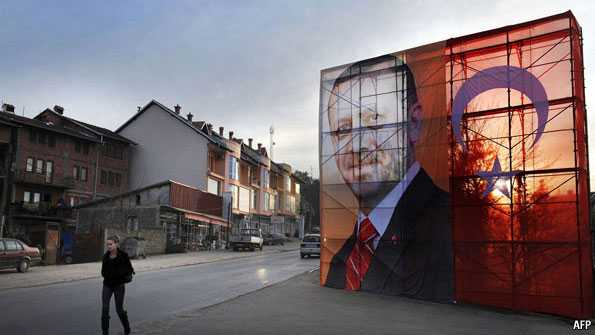Turkey in the Balkans
The good old days?
Talk of an Ottoman revival in the region seems exaggerated
Nov 5th 2011 | BELGRADE AND SARAJEVO | from the print edition

A shadow over an Ottoman domain
“SARAJEVO won today as much as Istanbul,” declared Recep Tayyip Erdogan, Turkey’s prime minister, after his election victory in June. His comment excited new debate in the western Balkans about Turkey’s activist foreign policy. Are the Ottomans coming back? Several examples suggest not.
In Ankara on October 22nd, Muslim politicians from Bosnia and Sandzak in Serbia praised the Turks for mending a rift between Serbia’s two Islamic groups. The deal swiftly collapsed. The Turks were also praised in 2010 for reconciling Serbia with Bosniak (Bosnian Muslim) politicians in Sarajevo. Yet relations between Bosniak, Serb and Croat politicians in Bosnia remain icy. A recent poll showed that views of Turkey in the region divide pretty clearly between Muslims (pro) and Christians (anti).
Turkey does better with soft power. Turkish soap operas have edged out Latin American ones in popularity. The Turks are busy restoring Ottoman monuments. Turkish schools and universities, some linked to the controversial Gulen movement, now educate several thousand pupils in Muslim regions. Petrit Selimi, Kosovo’s deputy foreign minister, notes that in the past Turkey was seen as “more backward than us.” Now, by contrast, it is a “modernising force.”
The western Balkans matter little economically. High-profile road and airport projects give a false impression of huge Turkish investment. Except in Albania and Kosovo, there has been more talk than cash. Alida Vracic, an analyst in Sarajevo, says that when Bosniaks go to Istanbul there is a lot of “kiss, kiss” for Balkan cousins, but the money goes to Serbia. Even there Turkey is not among the top 20 foreign investors.
The Turkish foreign minister, Ahmet Davutoglu, waxes lyrical about a “golden age” of the Balkans with Turkey. But Zarko Petrovic, a Serbian commentator, says the region’s interest is largely emotional. Accession to the European Union remains the priority. And, as one Serbian official mutters, “we don’t want to get too close to Turkey, because we don’t want to be seen as part of an EU losers’ club.”
via Turkey in the Balkans: The good old days? | The Economist.